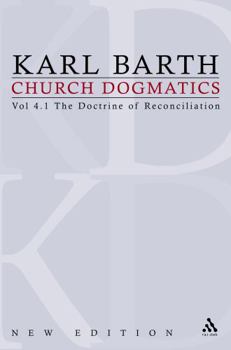Church Dogmatics: Volume 4 - The Doctrine of Reconciliation Part 1 - The Subject-Matter and Problems of the Doctrine O
(Book #4.1 in the Church Dogmatics Series)
Select Format
Select Condition 
Book Overview
Described by Pope Pius XII as the most important theologian since Thomas Aquinas, the Swiss pastor and theologian, Karl Barth, continues to be a major influence on students, scholars and preachers today.
Format:Hardcover
Language:English
ISBN:0567090418
ISBN13:9780567090416
Release Date:November 1956
Publisher:T&T Clark
Length:816 Pages
Weight:2.45 lbs.
Dimensions:2.3" x 5.8" x 8.6"
Customer Reviews
1 rating
A layperson struggles with Barth
Published by Thriftbooks.com User , 15 years ago
There is no question that Barth is a major thinker who helps us all with our faith journeys. For people like myself who hold quite liberal theologies, it seems particularly important to understand both his viewpoint and how he achieves it. As I understand it, Barth argues that following the flood, God made an absolute covenant with all of humanity--not merely with Israel--that without question or limitation God is with us and wants us to be with God. While he will never fail, we do so regularly; and it is Christ's mission to draw us into this relationship. Barth's knowledge of the Bible is prodigious, and a careful and critical understanding of text is the heart of his method. The Bible is God's word and that is where we must turn to understand god with us/we with God. This does not mean literal interpretation, but eschews hermeneutics that accept postmodern interpretation. Since The Doctrine of Reconciliation is Volume IV:1 of Church Dogmatics, a 6 million word, multi-volume work laying out Barth's thinking, it may not come as a surprise that he can be wordy, redundant, and very difficult to read. He in German, and the structure of his thinking is likely to be difficult for anglophone readers. It is filled with very long, very complex sentences that have all the charm of Kant or Schleiermacher. I often had to reread many sentences, since the first effort left me confused. For a layperson, my theological education is quite good; and I read the book in a reading group of people at my church who want to read primary source material. We all struggled with the literary style. We had the good fortune to have a leader who is working on his dissertation on Barth. He insists that as one gets accustomed to Barth's style, reading him becomes progressively easier. However, I confess that most of us relied on our leader's explanation and abandoned the text itself. Barth is important, and his thinking is magnificent. Despite the problems of doing so, it may be best for most of us to rely on secondary text to explore his contributions.






